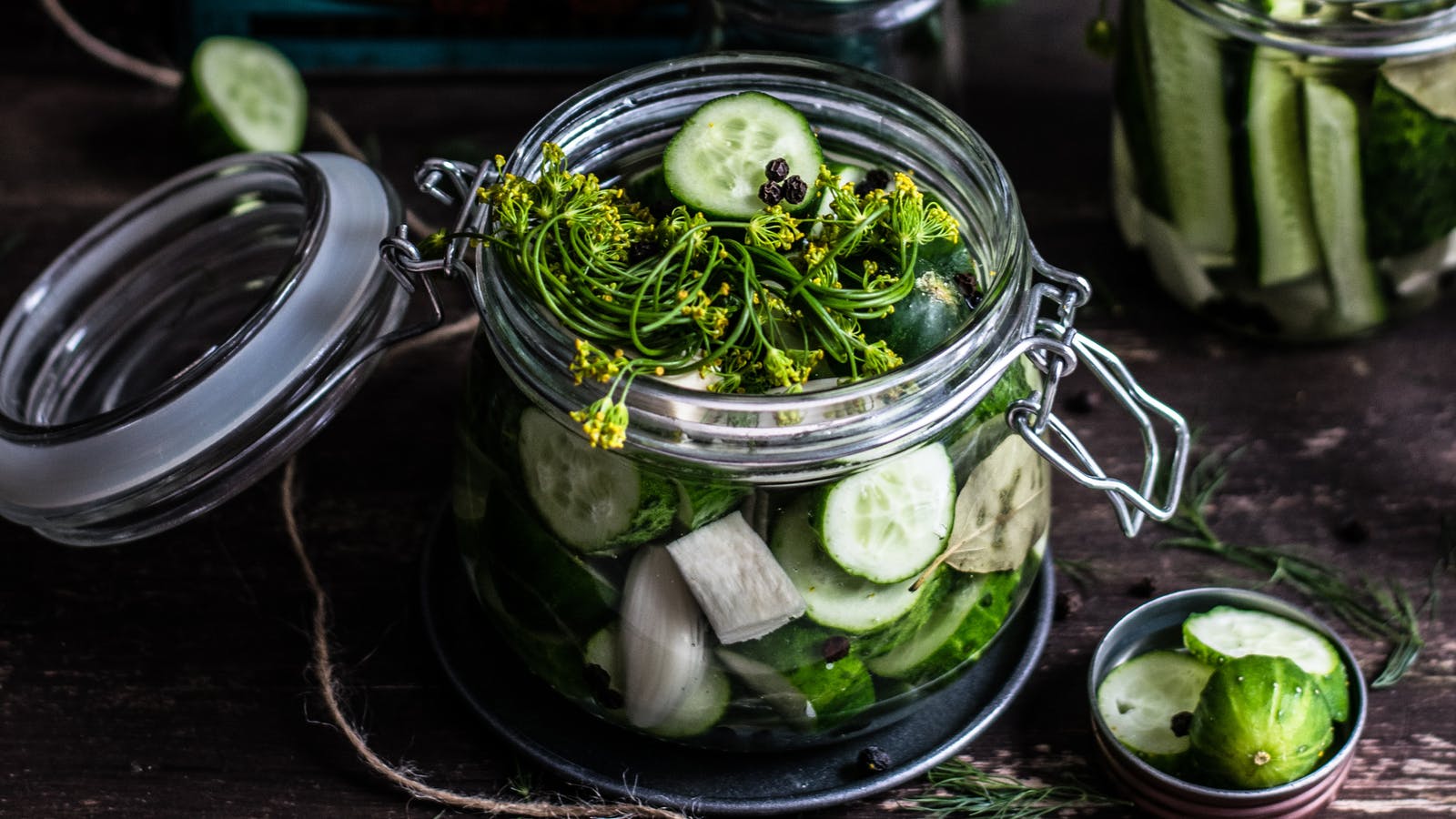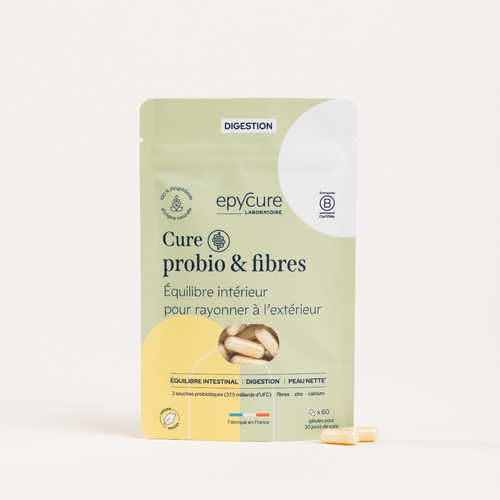Taking care of your body means first and foremost taking care of the inside , and more specifically by pampering your microbiota . The intestinal flora is made up of several billion bacteria , such as probiotics, whose benefits are well-proven for various problems such as digestive disorders or the immune system. In recent years, the supply of probiotic-based supplements has exploded, but we often forget that we can also find them directly on our plates!
What is a probiotic?
Probiotics are the “good bacteria” in our intestines that promote the balance of our different flora (intestinal, oral, cutaneous and vaginal) and combat any possible proliferation of bad bacteria.
What are the benefits of probiotics?
Due to its fragile nature, an unbalanced flora can be explained by several factors : stress, chronic diseases, taking antibiotics or even an unhealthy lifestyle... Ensuring that you maintain a balanced microbiota is therefore essential for taking care of your health. Indeed, probiotics are particularly interesting for strengthening your intestinal flora , especially in cases of transit disorders, a weakened immune system, or skin diseases such as atopic dermatitis or rosacea.
To help you understand probiotics, we invite you to read the article: What are the differences between probiotics, prebiotics, postbiotics and synbiotics?
Fermented foods, naturally rich in probiotics
What is lacto-fermentation?
Lacto -fermentation (or lactic fermentation) is a food preservation method that has been used for several centuries. It consists of macerating food in brine or vinegar, all without oxygen . In the absence of air, lactic acid bacteria will proliferate by feeding on the sugars naturally present in food (or added sugars) to transform into lactic acid . This lactic acid will destroy harmful bacteria , known as pathogens, to the benefit of good bacteria, which will continue to proliferate until they find a balance - this is when fermentation stops. Particularly useful for preserving food over the long term , from several months to several years, the presence of good bacteria makes them very interesting foods for the health of our microbiota.
💡Brine is a food preservation method that uses an aqueous salt solution to dehydrate foods. It is often used to preserve certain fish and cheeses.
8 Fermented Foods for a Balanced Gut Flora
Traditionally consumed in Asian countries, fermented foods are now popular worldwide for naturally taking care of one's health, due to their natural richness in probiotics . Here is a non-exhaustive list of foods to favor for a healthy intestinal flora:
-
Yogurts
Lacto-fermented foods are the first processed products consumed by humans. Their production relies on the addition of lactic acid bacteria. However, pasteurization is mandatory, which can impact the initial probiotic content. It is therefore important to favor yogurts like skyr or Greek yogurt , which are more concentrated in skimmed milk and therefore more likely to be more concentrated in probiotics.
-
Vegetable pickles
Vegetable pickles are marinated vegetables (gherkins, olives, carrots, red onions, radishes, etc.) in vinegar and sugar, with or without herbs or spices. Through lacto-fermentation, lactic microorganisms will proliferate and thus make the pickles beneficial for facilitating digestion , especially if eaten at the beginning of a meal.
-
Kimchi
A traditional Korean dish, kimchi is made from a preparation of lacto-fermented vegetables such as Chinese cabbage with garlic, ginger, or chili peppers, making it slightly spicy. In addition to being rich in lactic ferments, it has antioxidant and anti-inflammatory properties , essential for taking care of your health.
-
Sauerkraut
Sauerkraut, like kimchi, is a fermented cabbage recipe, widely used in France and especially in Alsace. It is obtained by lacto-fermentation in brine and its consumption is all the more interesting due to its high content of vitamins C, B6 and minerals such as iron and magnesium.
-
Kombucha
This fermented acidic tea , traditionally consumed in China, is increasingly popular in France for its taste as well as its health benefits. It also appears to be a healthier alternative to traditional sodas . Kombucha is fermented from an infusion of black tea sweetened with yeast and has demonstrated its action on weight regulation as well as on liver detoxification .
-
Kefir
It's a fermented drink made from kefir grains mixed with milk or fruit. These grains provide the kefir with different probiotic strains, forming a symbiotic relationship. Kefir is naturally fizzy and rich in probiotics thanks to the fermentation process. Its consumption is associated with a wide range of benefits, including anti-inflammatory, antioxidant , and antidiabetic properties.
-
Miso
Miso is mainly used as a base in broths in Japan , particularly in miso soup. It has the particularity of undergoing two very long fermentations (2 years) before obtaining the final product.
-
Tempeh
Tempeh, on the other hand, is produced from the fermentation of soybeans and is a functional, nutritious, and sustainable source of protein . Studies have shown its action on the digestive system by improving intestinal transit. It also acts as a growth stimulator for probiotics.
And what about sourdough bread?
Sourdough bread is a method of making bread by fermenting lactic acid bacteria and yeasts . It differs from chemical yeasts in that it has the advantage of containing significantly more lactic acid bacteria, but also reduces the blood sugar peak after a meal and is more digestible, especially for people with gluten intolerance, because it modifies the structure of the starch. However, its probiotic content is questionable, for good reason: the heat of cooking destroys a large part of the live bacteria.
Although the effects of fermented foods are beneficial for the microbiota, it remains important to note that some people may experience temporary side effects such as bloating or gas. However, special care is essential when consuming these products, as in the food industry, products such as pickles and sauerkraut are prepared with vinegar, sugar, and salt, which can cause intestinal discomfort.
How can we consume more of it every day?
Nothing could be simpler than incorporating fermented foods into your meals. You can add a small portion of fermented vegetables (pickles, sauerkraut, kimchi) as a starter in a salad or in a main course , or yogurt (preferably skyr or Greek yogurt) in your sauces or as a dessert. You can also drink a glass of kombucha or kefir with each meal to take care of your intestinal flora in the long term!
Alternatively, opt for our Probiotic & Fiber Cure which contains both probiotics and prebiotics to pamper your intestines, with just 2 capsules per day.
Take care of your flora, it will thank you!
Fermented foods to be consumed in moderation?
While there are many fermented foods with numerous benefits for our microbiota , there are some exceptions! In particular, we find alcohol, such as beer, or sausage, which can certainly provide beneficial nutritional benefits but more generally pose a health risk due to their fat or ethanol content .
Alcohol and processed products
Alcoholic fermentation is a method of transforming sugars into ethanol, allowing the appearance of beneficial microorganisms , but also a modification of the flavors, consistency and color of drinks .
Beer is one of the most consumed alcoholic beverages in the world. Its composition is said to provide antioxidant and phenolic compounds, fibers, and interesting minerals, thus improving the intestinal microbiota. This positive effect is, unfortunately, counteracted by, we're not telling you anything, its alcohol content! It still remains a good candidate as a functional food , that is, one that has "health" benefits, in the case of alcohol-free beers.
Sausage is no exception! Fermented primarily to improve its preservation properties , fat still remains the main component of the product, making it more harmful than beneficial for the intestinal microbiota.



